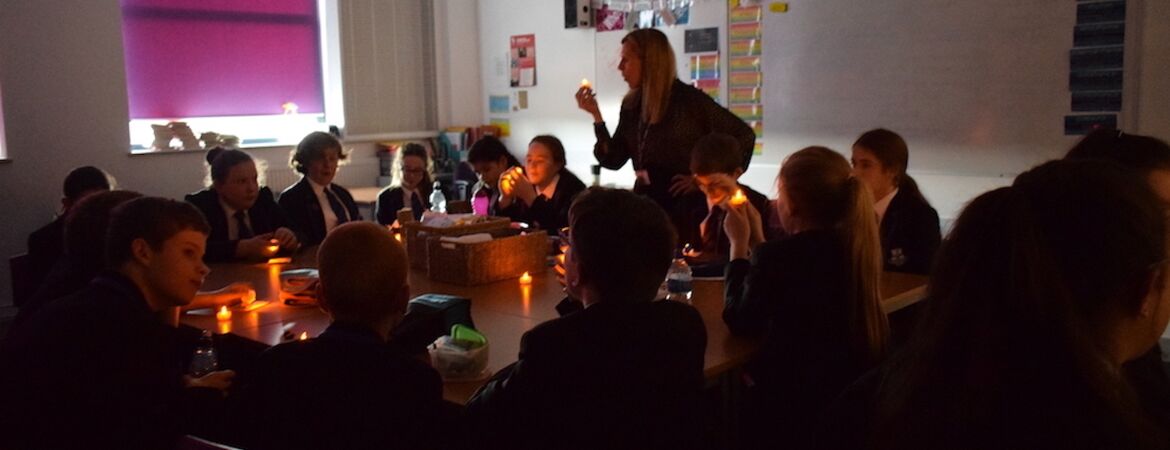Religious Education
At Trinity, all students will gain core understanding of major religious and non-religious traditions and how their beliefs, practices, moral and values have shaped and influenced the world we live in today.
Focus is given to Christianity where students explore major theological, philosophical, or ethical concepts and questions. Students reflect on how these beliefs, morals and values impact an individual’s worldview, way of life, and perspectives on contemporary issues in society. Students will be equipped with the tools and knowledge to be able to reach their own judgements and responses to the issues and questions examined. In our exploration of Philosophy and Ethics, we look at foundational arguments for and against the existence of God, the meaning of religious language, and how we can understand and apply ideas of ‘right’ and ‘wrong’ to ethical problems.
To broaden students’ knowledge of world faiths and non-religion, students learn about Islam, key concepts in Dharmic faiths, and the tenets of non-religious traditions such as Humanism. This enhances students’ understanding of a diverse range of perspectives and cultures and will help students to make sense of the world.
Students will leave Trinity with a deep knowledge of Christianity, Philosophy and Ethics. They will have an appreciation of cultural diversity and will have honed key skills such as interpretation, analysis, making considered judgments, abstract and critical thought, written and verbal communication, and research skills.
At Key Stage Three, students learn about the thoughts Christians, Muslims, Dharmic Faiths and non-religious people have about the world, the way that they live their lives, and their responses to issues within contemporary society. In year 7, students examine religious and non-religious thoughts, including histories, sacred texts, and theology. In year 8, students learn about religious and non-religious ways of life, including rituals, ceremonies, rites of passage and religious practices. In year 9, students learn about religious and non-religious perspectives on contemporary issues in society such as equality, liberty, and justice. This will provide breadth and variety, allowing students to deepen their knowledge of other cultures and systems of belief alongside preparing learners for KS4 religious education.
At Key Stage Four, students follow the AQA “Religious Studies (A)” syllabus. The GCSE is divided into two components: Paper 1, The Study of Religions, Beliefs and Practices and Paper 2, Thematic Studies. Each component is assessed by a written exam of 1 hour and 45 minutes at the end of Year 11. Within ‘Paper 1’ students study core beliefs and practices of Christianity and Islam. In ‘Paper 2’ students study the following themes: Religion and Life, Religion, Peace and Conflict, Religion and Relationships, and Religion Crime and Punishment. The syllabus explores questions about belief, values, meaning, truth, and purpose. It gives students the opportunity to critically analyse contentious ethical issues and to form independent judgements upon religious issues. Students will gain an appreciation of how religion, philosophy and ethics form the basis of our culture.
In the Sixth Form, students who have elected to study A level RE will follow a course divided into two components: Philosophy and Ethics and The Study of Religions and Dialogues. At Trinity, the core religion studied is Christianity, in line with the Christian character of the school. Amongst the variety of topics studied within Philosophy and Ethics, students will explore in-depth the classical philosophical arguments for the existence of God, such as: the Ontological, Cosmological and Teleological arguments. Students will explore the normative ethical theories of Situation Ethics, Virtue Ethics and Natural Moral Law. The Study of Religions and Dialogues comprises of the study of Christianity in relation to some of the following topics: sources of wisdom and authority, beliefs about God, the expression of religious identity, religion gender and sexuality, religion and science, religion and secularisation, and religious pluralism.
SEND and Religious Education at Trinity
At Trinity, it is an expectation that all lessons and wider resourcing has effective provision for students with SEND so that they can make equal progress to their peers. SEND data is analysed and used to inform planning and interventions where necessary.
In religious education all teachers consider the needs of SEND students in three ways.
Firstly, teachers consider a ‘seating check’. In religious education, this means reviewing the needs of the learners and seating students with SEND where it is most beneficial to their learning. For instance, any student with ADHD would be seated away from distractions.
Secondly all resources are checked to ensure they are SEND friendly. In religious education this means that resources are printed with clear front, are not visually cluttered and are dual coded.
Finally, the way religious education is implemented is at Trinity ensures all SEND students can make progress. This means that the curriculum is sequenced carefully to allow for students to progress through their learning more easily. Material is ‘chunked’ to avoid cognitive overload, and retrieval is embedded throughout the schemes of work, allowing for repetition and recall of previously learned content. Extended writing is well scaffolded, and students are provided with writing frames to enable them to successfully complete this activity.


